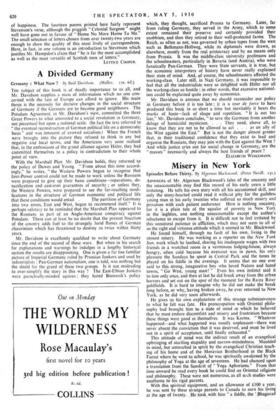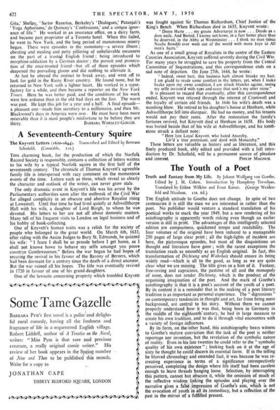Misery in New York
Episodes Before Thirty. By Algernon Blackwood. (Peter Nevill. i SS.)
ADMIRERS of Mr. Algernon Blackwood's tales of the uncanny and the unaccountable may find this record of his early years a little irritating. He tells his own story with all his accustomed skill, and only the stony-hearted could read it withcut pity for the guileless young man in his early twenties who suffered so much misery and privation with such patient endurance Here is nothing uncanny, for it is a plain tale of the squalor of poverty in New York in the Nighties, and nothing unaccountable except the author's reluctance to escape from it. It is'difficult not to feel irritated by this unnatural patience in affliction, which may not seem to all of us the right and virtuous attitude which it seemed to Mr. Blackwood.
He found himself, through no fault of his own, living in the utmost misery. He was working as a reporter on the New York Sun, work which he loathed, sharing his inadequate wages with two friends in a wretched room in a verminous lodging-house, always hungry, often cold because his overcoat was in pawn, his only pleasure the Sundays he spent in Central .Park and the tunes he played on his fiddle in the evenings. It seems that no one ever said to this strong, imaginative boy who loved Nature and hated towns, " Go West, young man! " Even his own instinct said it to him only once, and then at last he did break away from the urban horrors and set out on the spur of the moment for the Rainy River goldfields. It is hard to imagine why he did not make the break long before, or why, having broken away, he ever returned to New York, as he did very soon afterwards.
He gives us his own explanation of this strange submissiveness to what he felt was fate. His preoccupation with Oriental philo- sophy had brought him to a state of mind in which he believed that he must endure discomfott and misery and frustration because these things were good in themselves. It was Karma. " Whatever happened—and what happened was mostly unpleasant—there was never absent the conviction that it was deserved, and must be lived out in a spirit of acceptance, until finally exhausted."
This attitude of mind was the indirect result of an evangelical upbringing of startling stupidity and narrow-mindedness. Moulded in mind, but untouched in spirit by the evangelical Christian teach- ing of his home and of the Moravian Brotherhood in the Black Forest where he went to school, he was spiritually awakened by the philosophy of Yoga at the age of seventeen. He had chanced upon a translation from the Sanskrit of " Yoga Aphorisms." From that time onward he read every book he could find on Oriental religions and philosophy. These were not numerous, as all such studies were anathema to his rigid parents.
With this spiritual equipment, and an allowance of £100 a year, he was sent by these strange parents to Canada to earn his living at the age of twenty.. He took. with him " a fiddle, the Bhagavad
Gita,' Shelley, Sartor Resartus, Berkeley's 'Dialogues,' Patanjali's Yoga Aphorisms,' de Quincey's Confessions,' and a unique ignor- ance of life." He worked in an insurance office, on a dairy farm, and became part proprietor of a Toronto hotel. When this failed, he went to New York, and the long period of monotonous misery began. There were episodes in the monotony—a severe illness ; cheating and stealing and petty pilfering of unbelievable meanness on the part of a trusted English friend ; being introduced to morphine-addiction by a German doctor ; the pursuit and prosecu- tion of the once-trusted friend—but all of them episodes which deepened the prevailing gloom and did nothing to alleviate it.
At last he obeyed the instinct to break away, and went off to look for gold in the Rainy River country. He found none, but he returned to New York with a lighter heart. He worked in a scent- factory for a while, and then became a reporter on the New York Times. Here he was better paid, and the conditions of his work Were less arduous than in the old bad days on the Sun. The worst was past. He kept this job for a year and a half. A final episode— a pleasant one—made him secretary to a millionaire, and then Mr. Blackwood's days in America were over. He must have been more miserable than it is most people's misfortune to be before they are







































 Previous page
Previous page